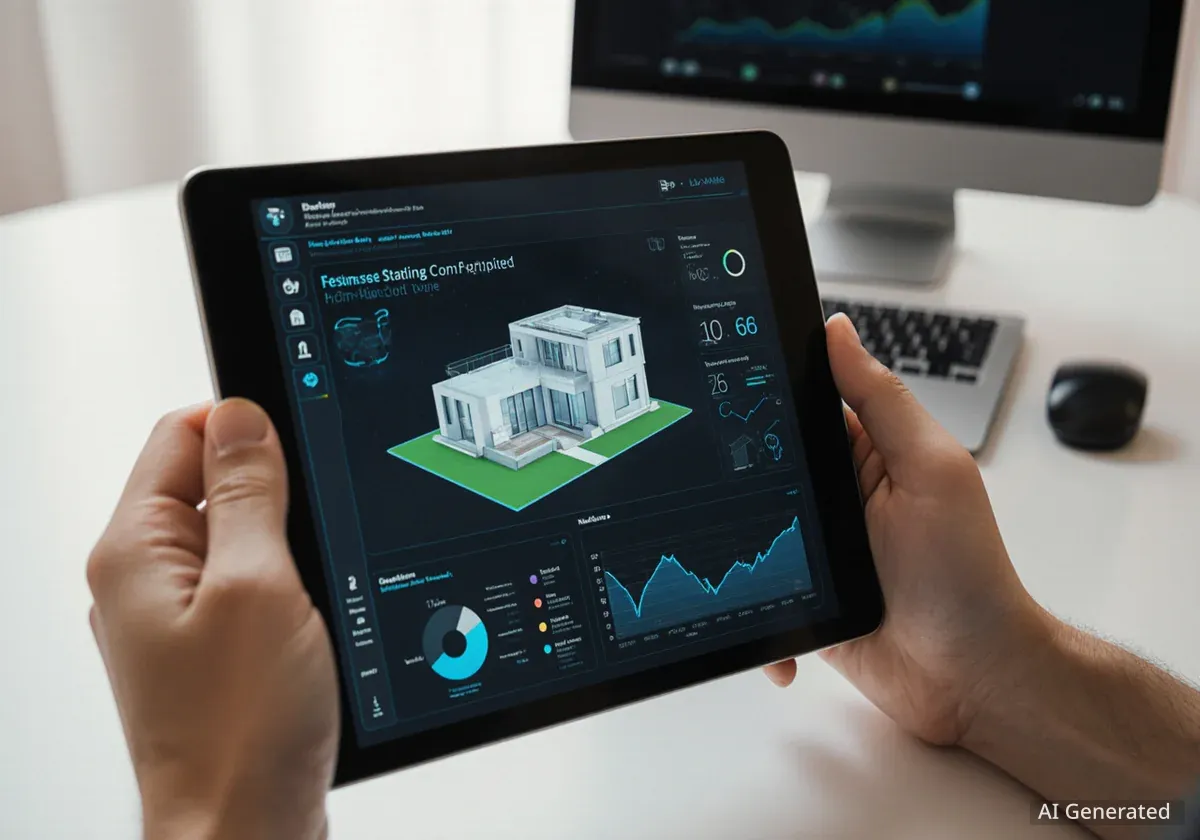The commercial real estate sector is on the cusp of a major technological shift, with blockchain technology moving beyond its cryptocurrency origins to offer new ways to manage property transactions, ownership, and financing. This evolution promises to unlock trillions of dollars in value by enhancing security, liquidity, and operational efficiency for property investors and managers.
While the adoption has been gradual, industry experts believe the integration of blockchain is inevitable, potentially transforming everything from how properties are bought and sold to how mortgages are handled within the next decade.
Key Takeaways
- Blockchain is being adopted in commercial real estate for its secure ledger capabilities, not just for cryptocurrency transactions.
- Tokenization allows for fractional ownership of properties, converting rights into tradable digital tokens and increasing market liquidity.
- New financial tools built on blockchain, combined with AI, are enabling transferable mortgages, which could unlock transactions stalled by high interest rates.
- Experts predict the entire real estate industry could operate on the blockchain within 10 years due to its security and efficiency.
From Digital Currency to Digital Deeds
For years, the conversation about cryptocurrency in real estate was limited to a few high-profile home sales paid for in Bitcoin. In most cases, the digital currency was simply converted back to dollars to complete the transaction. Now, the focus is shifting from the currency itself to the underlying technology: the blockchain.
Industry pioneers are looking at blockchain as a foundational tool for the future of commercial real estate (CRE). Its core function as a secure, unchangeable digital ledger makes it ideal for handling complex records like titles, deeds, and financing agreements.
"I don’t see how the entire real estate industry will not be on the blockchain within 10 years," said Tony Giordano, a luxury real estate broker and early crypto advocate. He describes the technology as a vast, secure digital filing cabinet capable of storing billions of records permanently and without risk.
"It’s just here, and people are recording everything already on it, and it’s the most secure platform and technology to do it."
This sentiment is echoed in industry analysis, which suggests blockchain-based smart contracts could fundamentally alter core CRE operations, including property sales, financing, leasing, and management.
Tokenization Unlocks New Investment Avenues
One of the most significant applications of blockchain in commercial real estate is tokenization. This process converts the ownership rights of a physical asset, like an office building or a retail center, into digital tokens that can be bought and sold on a secure network.
This innovation introduces two major benefits to a traditionally illiquid market:
- Fractional Ownership: Investors can purchase small shares of a high-value property, lowering the barrier to entry for commercial real estate investment.
- Increased Liquidity: Tokens can be traded more easily and quickly than physical property, creating a more dynamic and accessible market.
Trillions in Tokenized Assets
A recent analysis from the Deloitte Center for Financial Services projects that the value of tokenized real estate could grow from under $300 billion in 2024 to approximately $4 trillion by 2035. This growth is expected to expand the investor base and create new product offerings within the sector.
While U.S. regulations currently restrict domestic investors from purchasing tokens tied to U.S. properties, the market is open to international investors. This global access is a key driver of the technology's expected growth, potentially introducing trillions of dollars of new economic activity into the real estate sector over the next decade.
How Tokenization Works
Imagine a $50 million office building. Instead of one entity owning it, its ownership could be divided into 50 million digital tokens, each worth $1. Investors could then buy and sell these tokens on a marketplace, similar to trading stocks. All transactions are recorded securely on the blockchain, ensuring transparency and verifying ownership.
Solving the Interest Rate Puzzle with New Technology
Beyond ownership, blockchain is also poised to solve practical financial challenges. One of the biggest hurdles in the current commercial real estate market is interest rate lock-in. Many property owners hold mortgages with low rates secured years ago and are hesitant to sell because a new property would require financing at today's much higher rates.
New platforms are combining blockchain with artificial intelligence (AI) to create transferable mortgage bonds. This technology allows a property owner to transfer their existing loan and its favorable interest rate from one property to another.
"It would open up so many more transactions if people weren’t sitting on that interest rate," Giordano explained. The process involves AI performing a rapid risk analysis on the new property to assure the lender of its quality. The blockchain then securely facilitates the transfer of the mortgage bond.
This innovation could save property owners millions. For example, a building owner with a $20 million loan at 4.5% might face a $4 million prepayment penalty if they sell. By transferring the mortgage, that penalty is avoided, and the funds can be used as capital for the next investment.
For the property owner, the complexity of the underlying technology is less important than the result. "They don’t have to understand that AI and blockchain is on the back end helping the bank do it," Giordano noted. "They just understand that it’s secure from the blockchain."
A Gradual but Inevitable Transformation
The full integration of blockchain into commercial real estate will not happen overnight. Regulatory frameworks need to adapt, and industry players must become comfortable with the new technology. However, the momentum is building as more firms recognize its potential to reduce fraud, streamline processes, and create more efficient markets.
From smart contracts that automate lease payments to secure digital identities for all parties in a transaction, the applications are extensive. As the technology matures, it is expected to become a standard, invisible part of the real estate ecosystem, much like the internet is today.
The consensus among early adopters is clear: the commercial real estate industry is on the verge of a blockchain-powered revolution that will redefine how property is owned, managed, and traded for generations to come.





